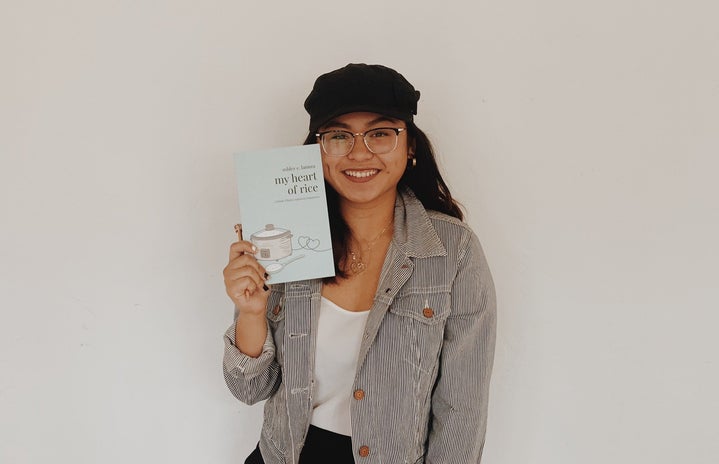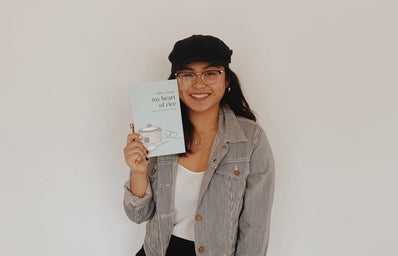The month of May celebrates Asian-American Pacific Islander (AAPI) Heritage Month. This celebration recognizes the influences, contributions and achievements of the AAPI community in the United States. From its history to its rich culture and its people, commemorating AAPIHM recognizes the strengths and resilience of the AAPI community.
Her Campus had the privilege of interviewing a rising Asian American author, Ashley Lanuza. A graduating UCLA senior with a major in Psychology, Lanuza paints her experiences as a Filipino American as she navigates the world she grew up in through her latest book, My Heart of Rice: A Poetic Filipino American Experience. During the interview, Lanuza shares her journey about being Fil-Am through the poetic retelling of her book through food, family and love for her culture.

Her Campus: When did you start writing? What are the inspirations for your writing?
Ashley Lanuza: I started writing when I was six years old. I wrote an alternative ending to a movie I had no business of seeing: Titanic. However, I really took writing seriously when I was 12 years old and won a city-wide poetry competition. Since then, I was inspired by the people around me, the events in my life and the feelings I would try to process. I’ve written short stories for friends, articles during political events, speeches for eulogies and poems to reflect on my thoughts, anxieties and feelings.
HC: What do you do when you encounter writer’s block? Do you keep writing or do you take a pause and start again at a later time, etc.?
AL: When it comes to writer’s block, I stop writing. I’ve tried word-vomiting, but it never really works for me. So, I just stop and do something else on my list. I usually get over the block when I’m walking to a destination or running on the treadmill- then once it hits me, I immediately write it down on my phone.
HC: What was the writing process like for you when you wrote My Heart of Rice?
AL: The process was very inconsistent. It takes a lot of discipline to keep a consistent schedule, especially as a college student, and I’m still working on it. But I always found time to write when I knew I was in a head space to, like after work or once I’ve completed my assignments for the day. However, the work you see now has been revised four or five times! I did all my revisions while I was abroad, so the writing process varied from evenings at a café in The Hague to seven-hour train rides between Amsterdam and Paris.
HC: How did you structure your chapters or which poems fit in where?
AL: I kept the timeline of past, present and future. The structures are chronological to what I had experienced, what I learned and what I thought of. I also thought about internal and external experiences. The collection starts off external- the food I’m exposed to. Then it touches on internal reflections. Then again external at school, and internal, and external and- you get the picture. The most obvious example of this is the external narratives from Chapter 9 to 12, then moving internally at Chapter 13 during a reflection period.
HC: I see that you incorporated a lot of historical narratives from Fil-Am history, how did you flow your stories and experiences to fit these with your own personal experiences?
AL: If you look at this work chronologically, of what parts are absorbed internally, Fil-Am history is what really opened my mind on this topic and piqued my interest in the academic sense. When I was able to empathize with these narratives and understand the human emotion, the pain and joy, that came with these histories, that was when I understood how important being Filipino American meant to me. If you take that idea, it fits into my journey as one of many “aha” moments that catalyze the rest of the collection.
HC: You weave together your experiences of being Filipina with growing up around Filipino and Hispanic communities (of Eagle Rock and Pasadena). How big do you think this impacted you retelling your stories through poetry? How do you think this helped or made it difficult to navigate identity growing up?
AL: Eagle Rock is known to be a very Filipino community, so I had all the food establishments around me and the people I saw were almost always Filipino. This type of community helped me make sense of what being Filipino was, but that’s as far as it went because my family didn’t participate in any cultural events if there were any around, to begin with. In Pasadena/San Gabriel, there are racial enclaves, but none were specifically Filipino. I was able to forget what it meant to be Filipino outside of the family, so in terms of navigating my identity, it made it a bit more difficult and also easy. These environments made it easier to think “out of sight, out of mind” because Filipino-ness no longer surrounded me. If anything, being Filipino felt nostalgic because it was tied to my home in Eagle Rock that I lived in for 14 years, compared to the San Gabriel Valley, where I lived in for only 4 to 5 years. There are a lot of senses involved with a neighborhood- sight, smells, sounds- that poetry felt the most genuine way to convey these feelings. I remember visiting Eagle Rock while in college and immediately wrote out a short poem about the streets I used to frequent. Both of these communities were a large impact to retelling my story, and poetry just felt the most heartfelt way to do so.
HC: What was your favorite part of the process in writing and producing My Heart of Rice?
AL: My favorite part about writing My Heart of Rice was seeking out the research and literature surrounding Filipino American histories. I remember geeking out about the papers I found, labeling some as “just for fun” reads even if it didn’t particularly pertain to my work. Conveying academia into creative art was incredibly rewarding because it felt accessible and beautiful, even though the content was rather traumatizing and painful to read.
HC: Finally, congrats on becoming a published author at such a young age! How does it feel?
AL: It feels weird and it doesn’t feel real! I think I’m still in denial that I have a book out. My mind is interpreting it like I just released a random article online, but no, it’s a full-blown book?! But I’m also super grateful. Not only for the opportunity but for the community of editors and supporters that motivated me to complete this work.
HC: Is there any advice you’d give aspiring writers who one day want to become published authors?
AL: Write from what you know. I was originally going to write an interview-based book on becoming a successful writer, but it didn’t feel genuine to me. Then, I brought the idea for My Heart of Rice, which was actually conceived long before my deal, and was encouraged to just do it. This was the content I felt the most personal satisfaction, so my advice is to not bullsh*t your way in. Speak from the heart. My other advice is to also speak with your mind and go with your guts. As a woman of color, completely new to the publishing industry, I was constantly intimidated. But I knew that this was a dream. I wanted it as perfect as it could possibly be, so I went with every gut decision and constantly asserted my voice with all decisions.
HC: What’s next? Any projects or endeavors lined up for you? What should we look out for in the near future?
AL: Currently, I’m just trying to graduate! I’m also thinking to publish a blog on studying abroad as a first-generation college woman. I had the blessed opportunity to experience a semester abroad in Europe, and there are a lot of caveats to those experiences. I learned to juggle a long-distance relationship, solo travels between countries, different cultures and languages, Dutch culture in contrast to American, and how to manage my bank account. There’s a lot of knowledge I want to share so that people can learn from my mistakes! In terms of publications, I hope I can write another book. I’m hesitant to do poetry because I don’t really want to be stuck in a niche, but it’s also my first love, so I’m not completely opposed.
We had so much fun getting to know Lanuza through this interview! Her passion for her culture is what strengthens the AAPI community, and it is only rightfully so that we give them the center stage during the month of May. For more information on Lanuza’s work, you can check out the behind-the-scenes of her book. We cannot wait to see what Lanuza dives into the near future with her talent, wit and heart. Congratulations on publishing your first book as well as your nearing graduation!



